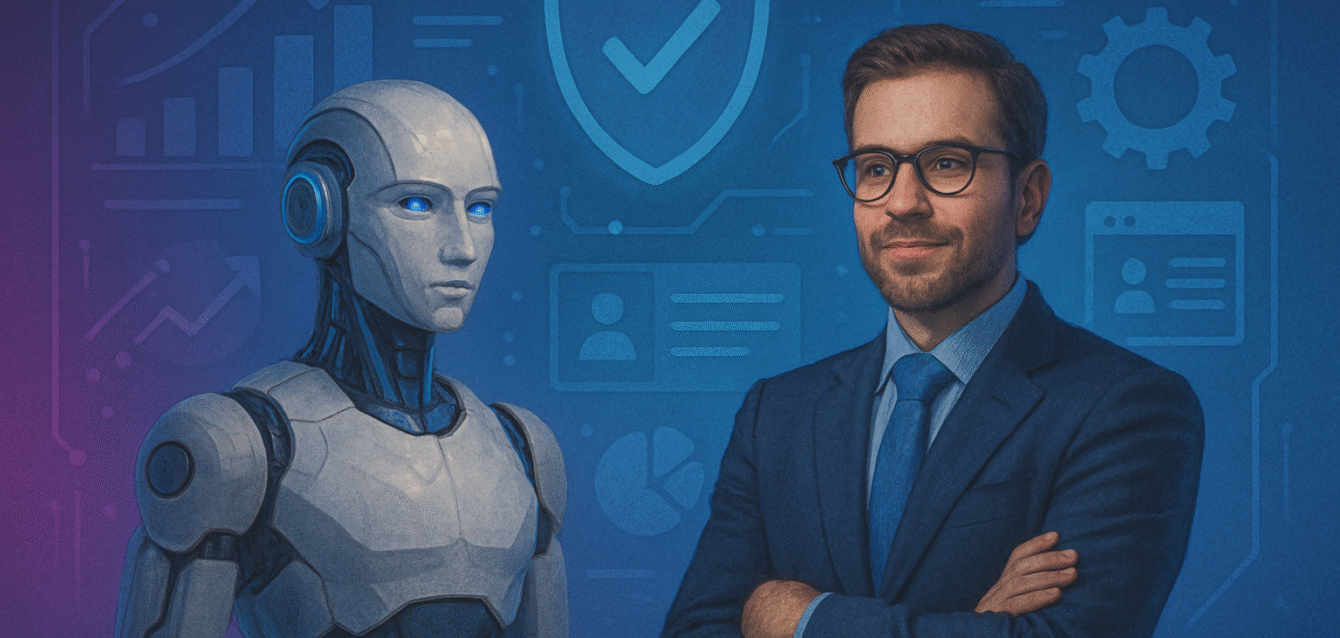The Dawn of the Autonomous Assistant
In 2025, Artificial Intelligence (AI) has moved far beyond the realm of science fiction and entered the core of business operations. While early AI applications focused on simple automation and data analysis, the emergence of AI agents represents a pivotal leap. Unlike traditional chatbots or static algorithms, AI agents are sophisticated software systems that leverage advanced AI, particularly large language models (LLMs) and deep learning, to autonomously pursue goals, make informed decisions, learn from experiences, and interact intelligently with their environment and users. They possess reasoning, planning, and memory, allowing them to engage in complex, multi-step tasks with minimal human oversight.
The evolution of AI agents has been a rapid journey. From the rule-based systems of early chatbots like ELIZA in the 1960s to the expert systems of the 70s and 80s, the focus was primarily on pre-programmed responses. The rise of machine learning in the 90s and the deep learning revolution of the 2010s (ushered in by breakthroughs like AlexNet and the proliferation of virtual assistants like Siri and Alexa) introduced the ability for AI to learn from data. However, the true “agentic” shift began around 2022 with the advent of powerful generative AI models like GPT-3 and ChatGPT. These models provided the foundational capabilities for AI systems to understand nuanced language, generate coherent text, and engage in more dynamic conversations. Today, AI agents can break down complex problems into smaller tasks, utilize various software tools, and even collaborate with other agents, marking a significant evolution from simple reactive bots to proactive, goal-oriented entities.
For businesses in 2025, understanding and strategically deploying AI agents isn’t just about technological adoption; it’s about unlocking new efficiencies, driving hyper-personalization, and gaining a significant competitive edge. This ultimate guide will explore their diverse applications, profound benefits, and best practices for seamless implementation.
Key Applications: AI Agents Revolutionizing Every Department
The versatility of AI agents means their impact is felt across virtually every facet of a modern business.
Customer Service: The Frontline of AI Innovation
AI agents are transforming customer service by providing instant, personalized, and scalable support, leading to faster resolutions and higher satisfaction.
- 24/7 Support: AI agents can handle inquiries around the clock, eliminating wait times regardless of time zones or business hours.
- Instant Query Resolution: They provide immediate answers to FAQs, common product queries, order statuses, and basic troubleshooting. Leading platforms now allow AI agents to understand natural language, even with misspellings or complex phrasing, and retrieve information from multiple internal systems like CRMs and knowledge bases.
- Automated Ticketing & Triage: Agents can analyze incoming requests, categorize them by urgency and type, and automatically route them to the most appropriate human agent or department, significantly reducing manual effort and improving response times (Automation Anywhere).
- Personalized Interactions: By accessing customer history and preferences, AI agents can offer tailored recommendations, proactively address potential issues, and adapt their communication style to the user’s sentiment (IBM).
- Omnichannel Consistency: AI agents can operate seamlessly across web chat, email, SMS, social media, and even voice, maintaining context and providing a unified customer experience.
- Self-Service Enhancement: They empower customers to resolve issues independently through guided troubleshooting and access to relevant knowledge articles, reducing the burden on human support teams.
Lead Generation: Precision and Efficiency in Prospecting
AI agents are redefining lead generation by engaging potential customers, qualifying prospects, and automating initial outreach.
- Intelligent Qualification: AI agents can interact with website visitors or social media users, asking targeted questions to assess their needs, budget, and timeline, effectively pre-qualifying leads before handing them over to sales teams.
- 24/7 Lead Capture: They work tirelessly, capturing lead information and engaging potential customers even outside of traditional business hours, ensuring no opportunity is missed.
- Personalized Outreach: Based on real-time interactions, AI agents can deliver tailored content, offer relevant resources, or provide immediate answers to questions that arise during a prospect’s journey, making the initial engagement more compelling.
- Automated Follow-ups: AI agents can initiate automated, personalized follow-up sequences via email or messaging apps based on lead behavior, keeping prospects engaged until they are ready for human interaction.
- Improved Lead Quality: By applying predefined qualification criteria, AI agents ensure that only genuinely interested and qualified leads are passed to sales, optimizing sales team efficiency.
CRM Integration: The Backbone of Holistic Customer Views
The true power of AI agents is unleashed when they are deeply integrated with Customer Relationship Management (CRM) systems.
- Unified Customer View: AI agents can pull and push data directly from and to the CRM, providing a 360-degree view of each customer, encompassing their history, preferences, interactions (both human and AI), and current status.
- Automated Data Entry: Chatbot conversations and interactions can automatically update customer records in the CRM, reducing manual data entry errors and ensuring data accuracy and freshness.
- Contextual Handoffs: When a human agent takes over from an AI agent, the full conversation history, along with relevant CRM data, is seamlessly transferred, allowing the human agent to pick up exactly where the AI left off without repeating information.
- Enhanced Personalization: CRM data fuels the AI agent’s ability to offer hyper-personalized recommendations, understand past issues, and tailor responses based on a deep understanding of the customer’s journey.
- Sales and Marketing Alignment: By centralizing lead and customer data, AI agents facilitate better alignment between sales and marketing efforts, ensuring consistent messaging and streamlined nurturing processes.
Social Media Engagement: Connecting Where Your Customers Are
Social media is a bustling hub, and AI agents are key to maximizing engagement on these platforms.
- Instant Responses on Messaging Apps: Platforms like Facebook Messenger, Instagram DMs, and WhatsApp are prime locations for AI agents to answer FAQs, provide product information, and resolve simple issues instantly.
- Lead Capture & Qualification: Agents can engage users who comment on posts or send direct messages, qualify their interest, and collect necessary contact details.
- 24/7 Sales & Support: From guiding customers through product catalogs to assisting with returns or service queries, AI agents provide continuous support directly within the social media interface.
- Personalized Content Delivery: Based on social media profile data and interaction history, agents can suggest relevant products, promotions, or content.
- Automated Event Registrations: Facilitate sign-ups for webinars, events, or workshops directly through social media messages.
Internal Operations: Driving Efficiency Beyond the Customer
AI agents aren’t just for external interactions; they are rapidly becoming indispensable for streamlining internal business processes, improving employee experiences, and boosting cross-departmental efficiency.
- Human Resources (HR):
- Automated Employee FAQs: AI agents can instantly answer common employee questions about company policies, benefits, payroll, and leave requests, significantly reducing HR administrative burden.
- Onboarding Assistance: They guide new hires through the onboarding process, providing necessary information, collecting documents, and answering initial queries.
- Training & Development: Agents can deliver training modules, track progress, and provide support for internal learning platforms.
- IT Support:
- Tier 1 Troubleshooting: AI agents handle common IT issues like password resets, network troubleshooting, and software installation guides, deflecting a large volume of tickets from the IT help desk.
- Ticket Triage & Routing: They can categorize IT support requests, gather necessary information, and route complex issues to the appropriate IT specialist.
- Self-Service Enablement: Agents direct employees to relevant knowledge base articles and solutions, empowering them to resolve minor issues independently.
- Project Management & Workflow Automation:
- Task Management: Assigning tasks, tracking progress, sending reminders, and identifying potential bottlenecks within project workflows.
- Meeting Coordination: Automating meeting scheduling, finding optimal times for participants, and sending out calendar invites.
- Document Management: Assisting with organizing, retrieving, and routing internal documents and approvals.
- Data Entry Automation: Automating repetitive data entry tasks across various internal systems, freeing up employees for more strategic work.
Benefits: Unlocking New Levels of Performance
The widespread adoption of AI agents in 2025 is driven by their clear, quantifiable benefits.
Cost Reduction: Doing More with Less
AI agents offer significant opportunities for operational cost savings.
- Lower Labor Costs: By automating repetitive and high-volume tasks, businesses can reduce the need for large teams dedicated to these functions. While not always leading to layoffs, this often means existing staff can be reallocated to more complex, strategic, and high-value work, achieving greater output per employee.
- 24/7 Operation Without Overtime: AI agents provide continuous service without incurring additional labor costs for overnight or weekend shifts.
- Reduced Training Expenses: For routine inquiries, AI agents deliver consistent, pre-programmed responses, reducing the need for extensive human agent training on basic matters.
- Scalability at Minimal Cost: AI agents can handle massive surges in demand without a proportional increase in costs, offering unmatched scalability during peak seasons or promotional events.
- Fewer Errors: Automated processes reduce the incidence of human error, preventing costly mistakes in data entry, customer interactions, or internal workflows.
Personalization: Building Deeper Customer Connections
Beyond simple customization, AI agents enable hyper-personalization, fostering stronger customer relationships.
- Individualized Interactions: AI agents leverage comprehensive customer data (from CRMs, purchase history, past interactions) to tailor every conversation, offer, and recommendation specifically to the individual user.
- Contextual Understanding: They maintain context across multiple interactions and channels, remembering past conversations and preferences to avoid repetitive questioning and provide more relevant, seamless experiences.
- Proactive Engagement: With predictive analytics, agents can anticipate customer needs or potential issues before they arise, offering timely and relevant solutions, which significantly boosts customer satisfaction and loyalty.
- Sentiment Awareness: Advanced AI agents can detect user sentiment (frustration, happiness, urgency) and adapt their tone and conversational approach accordingly, ensuring empathetic and effective interactions.
Efficiency: Streamlining Operations for Optimal Output
AI agents are powerful drivers of operational efficiency across the organization.
- Faster Response Times: Automated agents provide instant replies, drastically reducing customer wait times and improving resolution speeds.
- Automated Workflows: They can trigger actions in integrated systems, automate data transfer, and initiate follow-up processes, eliminating manual bottlenecks.
- Improved Resource Allocation: By handling routine tasks, AI agents free up human employees to focus on more complex, creative, and strategic activities that require human judgment and empathy.
- Consistent Service Delivery: AI agents ensure that every interaction adheres to predefined standards and best practices, leading to consistent service quality.
- Reduced Human Error: Automation of repetitive tasks minimizes the potential for human error, leading to more accurate data and processes.
How to Choose and Implement AI Agents
Successfully integrating AI agents into your business requires careful planning and execution.
Choosing the Right AI Agent Solution
The market for AI agents is rapidly expanding. Consider these factors when making your selection:
- Define Clear Objectives: What specific problems are you trying to solve? Are you aiming to reduce support costs, generate more leads, or improve internal efficiency? Clear objectives will guide your platform choice.
- Assess Your Existing Infrastructure: How well will the AI agent solution integrate with your current CRM, ERP, marketing automation platforms, and other essential business systems? API compatibility is crucial.
- Evaluate AI Capabilities (NLP, ML, Generative AI): Look for platforms with strong Natural Language Processing (NLP) for understanding user intent, robust Machine Learning (ML) for continuous improvement, and the ability to leverage Generative AI for more fluid and human-like conversations.
- Scalability: Can the solution handle your current volume of interactions and scale effectively as your business grows?
- Customization and Control: How much control do you have over the agent’s persona, conversation flows, and data utilization? Can it be tailored to your specific industry and brand voice?
- Data Security and Privacy: This is paramount. Ensure the platform adheres to strict data security standards and complies with relevant regulations (GDPR, CCPA, etc.). Understand how your data is used and stored.
- Training and Maintenance Requirements: How easy is it to train the agent with your specific data? What ongoing maintenance and human oversight are required?
- Vendor Support and Ecosystem: Evaluate the vendor’s reputation, customer support, and the availability of a community or marketplace for additional integrations and functionalities.
- Cost-Benefit Analysis: Beyond the initial investment, consider the total cost of ownership (TCO) including licensing, integration, training, and ongoing maintenance, and compare it against the projected ROI.
Implementing AI Agents: A Strategic Approach
Successful implementation goes beyond mere technology deployment.
- Start Small, Think Big: Begin with a pilot project in a well-defined area (e.g., automating FAQs for a specific product line or handling basic HR inquiries). This allows you to learn, refine, and demonstrate ROI before a broader rollout.
- Gather and Prepare Data: The quality of your AI agent’s performance is directly linked to the quality of its training data. Collect historical conversations, FAQs, product information, and relevant internal documents. Clean, label, and organize this data meticulously.
- Design Intent and Conversation Flows: Map out the various intents your AI agent needs to understand and design natural, intuitive conversation flows for each. Consider different ways users might phrase questions and how the agent should respond or escalate.
- Train and Test Rigorously: Continuously train your AI agent with new data. Conduct extensive testing with diverse user groups to identify shortcomings, refine responses, and optimize performance. Leverage A/B testing for different conversational approaches.
- Integrate Seamlessly: Ensure your AI agent is deeply integrated with your CRM and other essential systems. This is vital for personalized interactions and efficient data flow.
- Establish Human-in-the-Loop Processes: AI agents are powerful, but they are not infallible. Implement clear escalation paths to human agents for complex, sensitive, or novel queries. Human oversight is crucial for quality control and continuous learning.
- Monitor Performance and Iterate: Post-launch, continuously monitor key performance indicators (KPIs) such as deflection rates, resolution times, customer satisfaction scores (CSAT), and lead qualification rates. Use these insights to identify areas for improvement and regularly update your agent’s knowledge base and conversation logic.
- Communicate and Educate: Inform your employees and customers about the AI agent’s capabilities and purpose. Train your human teams on how to effectively collaborate with and leverage the AI agent.
Future Trends for 2026 and Beyond: The Horizon of AI Agents
The evolution of AI agents is accelerating, promising even more profound changes in the near future.
- Autonomous Decision-Making: AI agents will move beyond simple task execution to making more complex, independent decisions, managing end-to-end processes in areas like supply chain optimization or dynamic pricing.
- Multi-Agent Collaboration: Expect sophisticated ecosystems where multiple specialized AI agents collaborate autonomously to achieve complex goals, sharing information and coordinating actions across departments and even organizations (Gartner predicts increased adoption of composable business and multi-agent systems).
- Ethical AI Governance: As AI agents become more powerful, robust ethical guidelines, explainable AI (XAI) capabilities, and regulatory frameworks will become standard to ensure responsible and transparent deployment.
- Empathy and Emotional Intelligence: AI agents will develop more sophisticated abilities to detect and respond to human emotions, allowing for more empathetic and nuanced interactions, particularly in sensitive customer service or HR scenarios.
- Advanced Voice AI: Speech recognition and natural language generation will become indistinguishable from human speech, making voice the primary interface for many AI agent interactions.
- Proactive and Predictive Autonomy: Agents will not just react to queries but proactively anticipate needs, potential problems, or opportunities based on predictive analytics, taking action before human intervention is required.
- Edge AI Deployment: More AI agent functionalities will be deployed on edge devices, allowing for faster processing, reduced latency, and enhanced privacy for certain applications.
Case Studies and Industry Examples
The transformative impact of AI agents is already visible across various sectors:
- Banking (e.g., Erica by Bank of America): Erica, a virtual financial assistant, handles over 2 billion interactions, assisting customers with viewing balances, making transfers, paying bills, and even providing personalized financial insights, significantly reducing calls to human agents.
- E-commerce (e.g., Wayfair, online fashion retailers): AI agents streamline post-purchase support (Wayfair’s Agent Co-Pilot), suggest personalized product recommendations based on Browse behavior and past purchases, and guide customers through the sales funnel directly on social media platforms, leading to increased conversions and reduced abandoned carts.
- Healthcare (e.g., Cleveland Clinic): Patient-facing AI agents are streamlining non-urgent communication, helping with appointment scheduling, prescription reminders, bill payments, and collecting pre-visit forms, freeing up medical staff.
- Software (e.g., Adobe Experience Platform): Adobe uses AI assistants within its platform to reduce reliance on human agents for support and guidance, enabling users to troubleshoot issues and get information faster.
- Travel (e.g., Airlines): Major airlines leverage AI agents on messaging platforms to provide instant flight status updates, assist with check-ins, answer baggage queries, and manage basic booking changes, vastly improving customer self-service and reducing call center load.
These examples underscore that AI agents are not just a technological gimmick but a strategic investment yielding significant returns across the business landscape.
Conclusion: Preparing for an AI-Powered Future
The year 2025 marks a crucial turning point where AI agents transition from novel technology to essential business infrastructure. Their ability to deliver unparalleled personalization, drastically reduce operational costs, and drive efficiency across customer-facing and internal operations makes them indispensable for business success.
As highlighted by industry leaders like Gartner (who project significant enterprise AI adoption), the future belongs to businesses that strategically integrate AI agents. Search Engine Land and Semrush consistently emphasize the growing importance of AI for enhanced user experience and operational efficiency, directly impacting SEO and competitive advantage.
To prepare for and thrive in this AI-powered future, businesses must:
- Develop a clear AI strategy aligning agent deployments with overarching business objectives.
- Invest in robust data governance to fuel AI agents responsibly and securely.
- Prioritize seamless integration with existing CRM, ERP, and other critical systems.
- Foster a culture of human-AI collaboration, upskilling employees to work alongside intelligent agents.
- Embrace continuous learning and iteration, regularly optimizing agents based on performance data and evolving customer needs.
By proactively embracing the power of AI agents and committing to their thoughtful implementation, businesses can not only meet the demands of today’s market but also build a resilient, efficient, and customer-centric operation poised for unparalleled success in 2026 and beyond.





